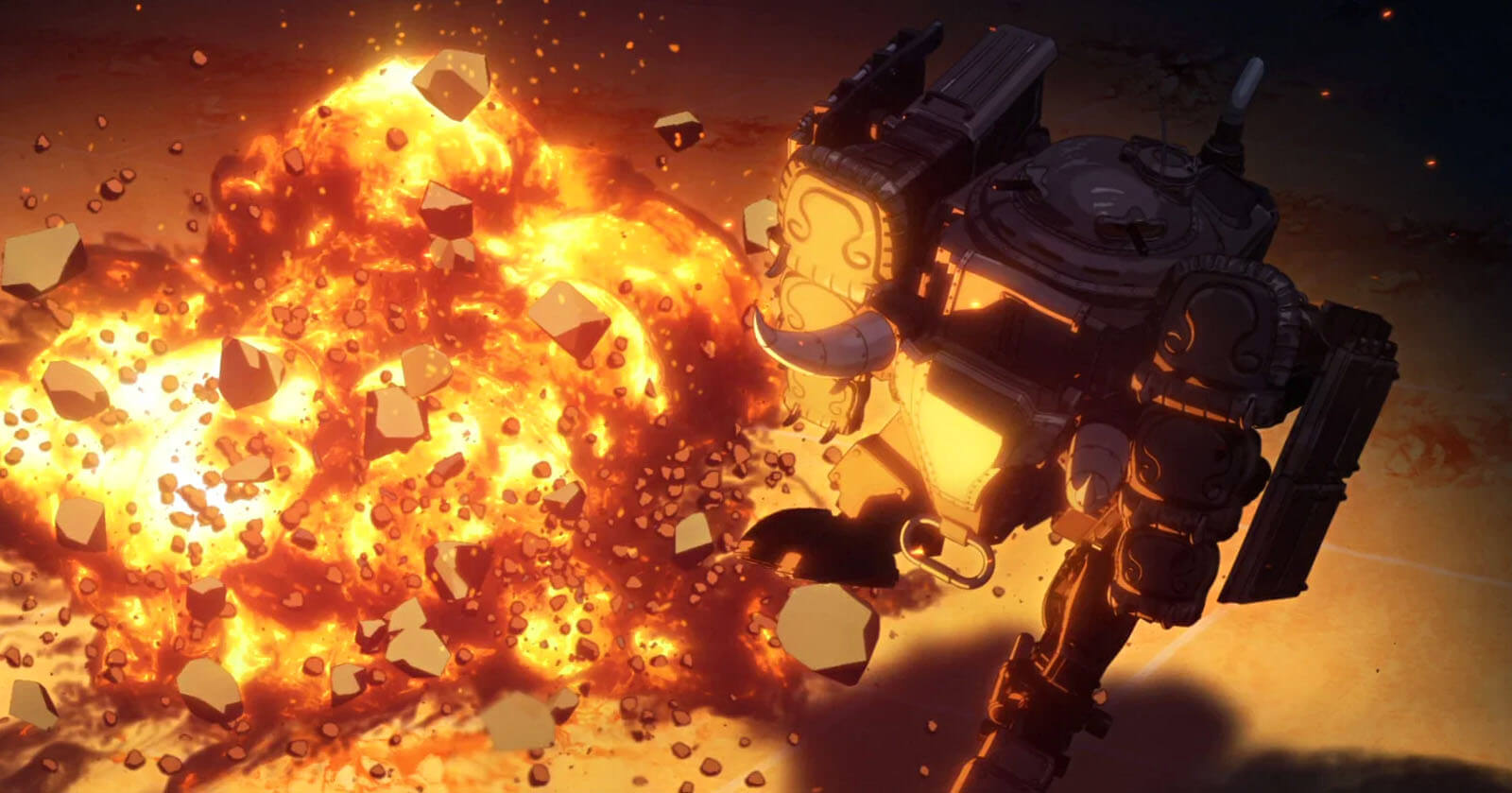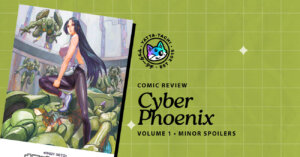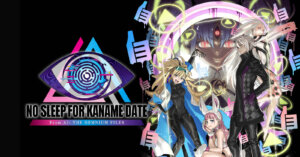Synopsis
Based on a trilogy of young adult novels written by Scott Westerfeld and illustrated by Keith Thompson, Leviathan presents a steampunk alternate universe version of World War I. The Central Powers are “Clankers” who pilot giant robots. The Allied Powers are “Darwinists” with an arsenal of genetically engineered “Beasties.” On the Clanker side, Prince Aleksandar of the Austria-Hungarian Empire is on the run after his father’s assassination starts the war. On the Darwinist side, poor girl Deryn Sharp disguises herself as a boy, “Dylan,” to fly with the British navy on the Leviathan whale-ship. These two teenagers’ paths collide on a journey that will determine the fate of the world.
The Good
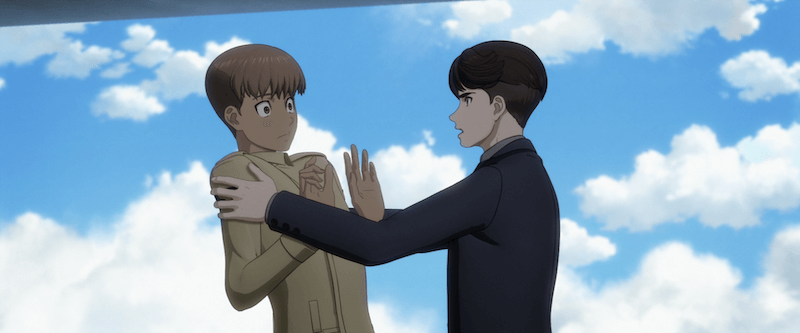
Orange is still the best anime studio around when it comes to computer animation, and their work on Leviathan in collaboration with Qubic Pictures is beautiful as expected. The elaborately-designed machines and Beasties are well-suited to the strengths of 3D animation, making for exciting action scenes. The globe-trotting adventure also provides a variety of stunning settings. Owing to the more realistic art style, the human character animation isn’t quite as expressive as Orange’s work in Trigun Stampede, but still features impressive and subtle acting. The end credits sequence, featuring different pieces of concept art each episode and accompanied by a song from Miyazaki’s regular composer Joe Hisaishi, will only heighten your appreciation for the artistic effort put into this production.
Alek and Sharp are likable protagonists, finding common ground in their moral convictions even though they’re supposed to be on opposite sides of the war. Both struggle with putting up facades around each other, though Sharp’s a bit… sharper (no pun intended) and figures out Alek’s deal well before he figures out hers. Memorable supporting characters include Dr. Nora Barlow, a feminist scientist who supports Sharp, and Lilit, a revolutionary fighting the Ottoman Empire who contributes some welcome queer energy to the story.
I alternated between the English and Japanese language tracks while watching. Both have their ups and downs, but I preferred Alek’s Japanese voice (Ayumu Murase) because he sounded more convincing as a teenager and Sharp’s English voice (Broghanne Jessamine) because of her authentic Scottish accent.
The Bad

Here’s the big stumbling block I can’t get over with Leviathan: the Beasties make no logical sense and I feel bad for them. What does the titular whale-ship eat? Is there krill in the sky? Whales are some of the most intelligent animals around—how does it feel for one to be used as a vehicle in war? It’s certainly extra sad when one gets shot out of the sky. While the story tries to present the Darwinists as being “closer to nature,” genetically engineering creatures just to suffer as tools of war feels like a bad thing and the Clankers are right to just use robots for such duties. I love the Catbus and Molcars as much as anyone, but the appeal of those animal-vehicle hybrids is that they have personalities. They want you to ride them. Also, nobody’s sending them to war. Most of Leviathan’s Beasties might as well be animal-shaped machines, since they barely behave like animals. Even the one Beastie the show introduces as a potential Pokemon-like friend is treated as just another device.
Maybe my issues with Leviathan’s logic and worldbuilding would have been solved if the story wasn’t so rushed. I haven’t read the novels, but I know that condensing three 400-500 page books into 12 episodes of anime means a lot had to be cut in this adaptation. We’ve seen a lot of anime recently (Mobile Suit Gundam GQuuuuuuX and Lazarus are the first two that spring to mind) that would have been improved by having double the number of episodes. Leviathan is among the most extreme examples so far. Plot points feel rushed or underdeveloped, resulting in a story that often feels too obvious in its beats (at least from the perspective of this adult viewer). Paradoxically, the pacing of individual episodes, especially the first few, feels slow on a moment-to-moment basis. This is likely the result of Netflix letting episodes run longer than the strict time limits of TV anime.
The Verdict
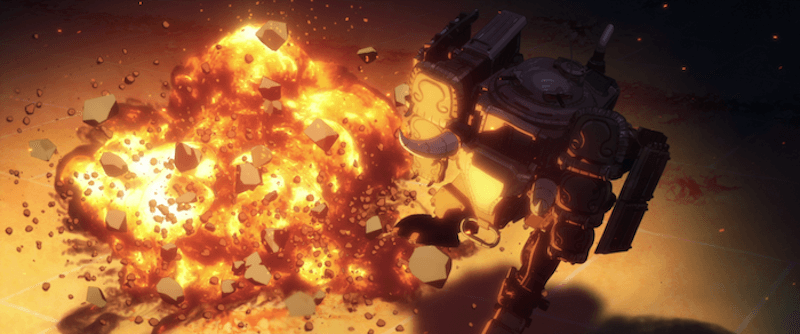
Leviathan is a well-meaning, handsomely mounted production that I had trouble getting into despite its strengths. It has many neat ideas but fails to develop them to satisfying ends, and one big idea – the Darwinists’ biotech Beasties – is handled so questionably that one wonders if the writers thought through its implications. The anime offers plenty of great eye candy, and the YA story might play better with younger viewers, but it’s not going to rank among my personal favorites.
All 12 episodes of Leviathan premiere on Netflix on July 10th, 2025.
If you liked Leviathan, you might also like…
- Steamboy
- Last Exile
- Fullmetal Alchemist
Credits
Based on the books by Scott Westerfeld and illustrated by Keith Thompson
Directed by Christophe Ferriera
Written by Yuichiro Kido
Starring Natsume Fujiwara, Ayumu Murase, Shunsuke Sakuya
Produced by Justin Leach, Taiki Sakurai, Katrina Minett, Yoshihiro Watanabe
A special thanks to Netflix for providing us with advance screeners. Receiving early access to this anime has in no way altered the opinions expressed in this article.
Article edited by: Adam Wescott
The Good
- Beautiful visuals
- Likable characters
The Bad
- Too many logical/ethical questions about the Beasties
- Moves both too fast AND too slow

Featured Sponsor - JAST
The sweetest romance and the darkest corruption, the biggest titles and the indie darlings; for visual novels and eroge, there's nowhere better.
Big thank you to our supporters
From their continous support, we are able to pay our team for their time and hard work on the site.
We have a Thank-You page dedicated to those who help us continue the work that we’ve been doing.
See our thank you page